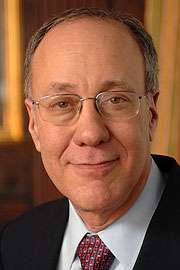Roger Myerson
| Roger Myerson | |
|---|---|
 | |
| Born |
March 29, 1951 Boston, Massachusetts |
| Nationality | United States |
| Institution |
University of Chicago Northwestern University |
| Field | Game theory |
| Alma mater | Harvard University |
| Doctoral advisor | Kenneth Arrow |
| Doctoral students |
Michael Chwe Aytek Erdil Yukio Koriyama |
| Contributions | Mechanism design |
| Awards | Nobel Memorial Prize in Economic Sciences (2007) |
| Information at IDEAS / RePEc | |
Roger Bruce Myerson (born March 29, 1951) is an American economist and winner of the Sveriges Riksbank Prize in Economic Sciences in Memory of Alfred Nobel, sometimes referred to as the "Nobel Prize" for economics, with Leonid Hurwicz and Eric Maskin for "having laid the foundations of mechanism design theory."[1] A professor at the University of Chicago, he has made contributions as an economist and as a political scientist.
Biography
Roger Myerson was born on March 29, 1951, in Boston, to a Jewish family. He attended Harvard University, where he received his A.B., summa cum laude, and S.M. in applied mathematics in 1973. He completed his Ph.D. in applied mathematics from Harvard University in 1976.[2] His doctorate thesis was A Theory of Cooperative Games.[3]
From 1976 to 2001, Myerson was a professor of economics at Northwestern University's Kellogg School of Management, where he conducted much of his Nobel-winning research.[4] From 1978 to 1979, he was Visiting Researcher at Bielefeld University. He was Visiting Professor of Economics at the University of Chicago from 1985–86 and from 2000–01. He became Professor of Economics at Chicago in 2001. Currently, he is the Glen A. Lloyd Distinguished Service Professor of Economics at the University of Chicago.[3]
Bank of Sweden Nobel Memorial Prize
Myerson was one of the three winners of the 2007 Nobel Memorial Prize in Economic Sciences, the other two being Leonid Hurwicz of the University of Minnesota, and Eric Maskin of the Institute for Advanced Study. He was awarded the prize for his contributions to mechanism design theory.[5]
Myerson made a path-breaking contribution to mechanism design theory when he discovered a fundamental connection between the allocation to be implemented and the monetary transfers needed to induce informed agents to reveal their information truthfully. Mechanism design theory allows for people to distinguish situations in which markets work well from those in which they do not. The theory has helped economists identify efficient trading mechanisms, regulation schemes, and voting procedures. Today, the theory plays a central role in many areas of economics and parts of political science.[5]
Personal life
In 1980, Myerson married Regina (Weber) and the couple had two children, Daniel and Rebecca.[6]
Publications
- Game theory and mechanism design
- "Graphs and Cooperation in Games," Mathematics of Operations Research 2 (1977), 225–229.
- "Two-Person Bargaining Problems and Comparable Utility," Econometrica 45 (1977), 1631–1637.
- "Refinements of the Nash Equilibrium Concept," International Journal of Game Theory 7 (1978), 73–80.
- "Incentive Compatibility and the Bargaining Problem," Econometrica 47 (1979), 61–73.
- "Optimal Auction Design," Mathematics of Operations Research 6 (1981), 58–73.
- "Mechanism Design by an Informed Principal," Econometrica 51 (1983), 1767–1797.
- "Two-Person Bargaining Problems with Incomplete Information," Econometrica 52 (1984), 461–487.
- "Bayesian Equilibrium and Incentive Compatibility," in Social Goals and Social Organization, edited by L. Hurwicz, D. Schmeidler, and Hugo Sonnenschein, Cambridge University Press (1985), 229–259.
He wrote a general textbook on game theory in 1991, and has also written on the history of game theory, including his review of the origins and significance of noncooperative game theory.[7] He also served on the editorial board of the International Journal of Game Theory for ten years.
Myerson has worked on economic analysis of political institutions and written several major survey papers:
- "Analysis of Democratic Institutions: Structure, Conduct, and Performance," Journal of Economic Perspectives 9:1 (1995), 77–89.
- "Economic Analysis of Political Institutions: An Introduction," Advances in Economic Theory and Econometrics: Theory and Applications, volume 1, edited by D. Kreps and K. Wallis (Cambridge University Press, 1997), pages 46–65.
- "Theoretical Comparisons of Electoral Systems," European Economic Review 43 (1999), 671–697.
His recent work on democratization has raised critical questions about American policy in occupied Iraq.[8]
- Books
- Game Theory: Analysis of Conflict, Harvard University Press, 1991.
- Probability Models for Economic Decisions, Duxbury Press, 2005.
Concepts named after him
See also
References
- ↑ "The Sveriges Riksbank Prize in Economic Sciences in Memory of Alfred Nobel 2007" (Press release). Nobel Foundation. October 15, 2007. Retrieved 2008-08-15.
- ↑ http://www.pritzkermilitary.org/whats_on/pritzker-military-presents/front-center-john-callaway-global-economic-crisis/
- 1 2 "Curriculum Vitae of Roger Myerson" (PDF). Retrieved 2008-08-15.
- ↑ JUF News: Nobel Prize winners have Jewish, Chicago connections
- 1 2 "Roger Myerson wins 2007 Nobel Memorial Prize in Economics". University of Chicago. 2007-10-17. Retrieved 2008-08-16.
- ↑ "Roger B. Myerson – Autobiography". Nobelprize.org.
- ↑ Myerson, Roger B. (1999). "Nash Equilibrium and the History of Economic Theory". Journal of Economic Literature 37: 1067–1082.
- ↑ Myerson, Roger B. (2006). "Federalism and Incentives for Success of Democracy". Quarterly Journal of Political Science: 3–23.
External links
- Myerson Nobel Prize lecture
- Webpage at the University of Chicago
- ABC News Chicago interview
- Roger Myerson at the Mathematics Genealogy Project
- The scientific background to the 2007 Nobel prize: Mechanism Design Theory
- Myerson participated in panel discussion, The Global Economic Crisis: What Does It Mean for U.S. National Security? at the Pritzker Military Museum & Library on April 2, 2009
